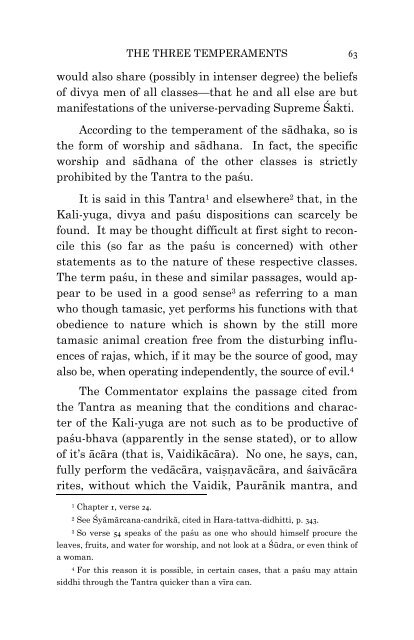Introduction to Tantra Sastra - Aghori
Introduction to Tantra Sastra - Aghori
Introduction to Tantra Sastra - Aghori
You also want an ePaper? Increase the reach of your titles
YUMPU automatically turns print PDFs into web optimized ePapers that Google loves.
THE THREE TEMPERAMENTS 63<br />
would also share (possibly in intenser degree) the beliefs<br />
of divya men of all classes—that he and all else are but<br />
manifestations of the universe-pervading Supreme Śakti.<br />
According <strong>to</strong> the temperament of the sādhaka, so is<br />
the form of worship and sādhana. In fact, the specific<br />
worship and sādhana of the other classes is strictly<br />
prohibited by the <strong>Tantra</strong> <strong>to</strong> the paśu.<br />
It is said in this <strong>Tantra</strong> 1 and elsewhere 2 that, in the<br />
Kali-yuga, divya and paśu dispositions can scarcely be<br />
found. It may be thought difficult at first sight <strong>to</strong> reconcile<br />
this (so far as the paśu is concerned) with other<br />
statements as <strong>to</strong> the nature of these respective classes.<br />
The term paśu, in these and similar passages, would appear<br />
<strong>to</strong> be used in a good sense 3 as referring <strong>to</strong> a man<br />
who though tamasic, yet performs his functions with that<br />
obedience <strong>to</strong> nature which is shown by the still more<br />
tamasic animal creation free from the disturbing influences<br />
of rajas, which, if it may be the source of good, may<br />
also be, when operating independently, the source of evil. 4<br />
The Commenta<strong>to</strong>r explains the passage cited from<br />
the <strong>Tantra</strong> as meaning that the conditions and character<br />
of the Kali-yuga are not such as <strong>to</strong> be productive of<br />
paśu-bhava (apparently in the sense stated), or <strong>to</strong> allow<br />
of it’s ācāra (that is, Vaidikācāra). No one, he says, can,<br />
fully perform the vedācāra, vaiṣṇ avācāra, and śaivācāra<br />
rites, without which the Vaidik, Paurānik mantra, and<br />
1 Chapter 1, verse 24.<br />
2 See Śyāmārcana-candrikā, cited in Hara-tattva-didhitti, p. 343.<br />
3 So verse 54 speaks of the paśu as one who should himself procure the<br />
leaves, fruits, and water for worship, and not look at a Śūdra, or even think of<br />
a woman.<br />
4 For this reason it is possible, in certain cases, that a paśu may attain<br />
siddhi through the <strong>Tantra</strong> quicker than a vīra can.

















